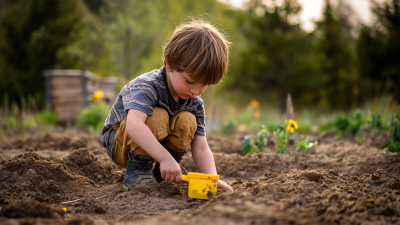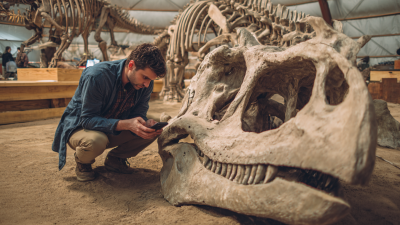5 Smart Tips to Enhance Learning with Stem Science Kits
Table of Contents
- Understanding the Importance of STEM Education for Young Learners
- Identifying Suitable STEM Science Kits for Different Age Groups
- Incorporating Hands-On Activities to Foster Engagement and Curiosity
- Utilizing Technology to Supplement Learning with STEM Kits
- Encouraging Collaborative Learning and Team Projects with STEM Kits
- Tracking Progress and Assessing Learning Outcomes from STEM Activities
- FAQS
- Conclusion
- Related Posts
In recent years, the demand for innovative educational tools, such as Stem Science Kits, has surged, reflecting a growing recognition of their importance in enhancing children's learning experiences. According to a report by MarketsandMarkets, the global STEM education market is projected to reach $3.4 billion by 2025, driven by the increasing emphasis on science, technology, engineering, and mathematics in educational curricula worldwide.

Jinhua City Dukoo Toys Co., Ltd., established in 2009, has been at the forefront of this educational revolution by producing high-quality archaeological toys that inspire curiosity and exploration among young learners. With nearly 13 years of experience and a remarkable expansion from 400 square meters to 8000 square meters, Dukoo Toys is committed to customizing innovative products that cater to diverse educational needs, ensuring that children around the globe can engage in hands-on learning through exciting Stem Science Kits.
Understanding the Importance of STEM Education for Young Learners
STEM education plays a crucial role in the holistic development of young learners. By integrating science, technology, engineering, and mathematics into their learning experience, children not only develop critical thinking and problem-solving skills but also foster creativity and curiosity. Engaging with STEM science kits helps to build a strong foundation for these essential abilities, preparing students for a future that increasingly relies on technology and innovation.
One effective tip to enhance learning with STEM kits is to encourage hands-on experimentation. Allow children to explore the kits independently, promoting trial-and-error methods. This approach not only reinforces theoretical knowledge but also instills resilience and perseverance in young learners. Additionally, integrating real-world applications can significantly boost interest. Create projects that relate to everyday life, such as designing a simple water filtration system. This connection makes learning relevant and exciting.
Lastly, collaboration is key in STEM education. Encourage children to work in groups, where they can share ideas, divide tasks, and learn from one another. This cooperative environment not only enhances social skills but also allows for diverse perspectives that can lead to richer outcomes in their projects. Emphasizing teamwork in STEM activities equips young learners with essential life skills while making the learning process enjoyable and impactful.
Identifying Suitable STEM Science Kits for Different Age Groups
When selecting STEM science kits, it's crucial to consider the age appropriateness of the kits to ensure effective learning. For younger children, typically ages 4 to 8, engaging kits that incorporate bright colors and interactive elements are ideal. These kits often focus on foundational concepts in science and math through play-based learning, such as building simple structures or conducting safe experiments. Look for kits that promote hands-on activities, as this age group thrives on exploration and discovery.
As children grow older, around ages 9 to 12, their interests and cognitive skills expand, allowing for more complex kits that delve into specific fields like robotics, chemistry, or physics. At this stage, kits that encourage critical thinking and problem-solving can be particularly beneficial. Choose kits that challenge them to build more intricate models or conduct experiments that require data collection and analysis. For teens aged 13 and up, advanced STEM kits that prepare them for high school or college-level concepts can provide a deeper understanding of scientific principles, often integrating technology and coding to appeal to their expanding skill set.
Incorporating Hands-On Activities to Foster Engagement and Curiosity
Incorporating hands-on activities into learning can significantly boost engagement and curiosity, especially when using STEM science kits. These kits provide a unique opportunity for students to explore complex concepts through practical experiences. One effective tip to enhance learning is to encourage students to ask questions during activities. This fosters a sense of inquiry and drives deeper understanding as they predict outcomes and analyze results.
Another strategy is to integrate collaborative projects that require teamwork. When students work together on experiments, they not only learn from the hands-on experience but also develop essential communication skills and build relationships. This collaborative environment makes learning more enjoyable and memorable, stimulating curiosity as students share their findings and challenge each other's ideas.
Additionally, providing opportunities for reflection after hands-on activities is crucial. Encourage students to discuss what they learned, the challenges they faced, and how they solved problems during their projects. This not only reinforces their understanding but also cultivates an ongoing desire to explore and investigate broader topics in STEM, keeping the flame of curiosity alive.
Utilizing Technology to Supplement Learning with STEM Kits
Incorporating technology into learning with STEM kits can greatly enhance the educational experience for young learners. Virtual teaching platforms have emerged as powerful tools for engaging both parents and children in STEM activities, making it easier to explore complex concepts from the comfort of home. By utilizing online resources and interactive modules, families can dive into subjects such as climate change and sustainability, sparking curiosity and promoting hands-on learning experiences that are essential for long-term interest in STEM fields.
Additionally, integrating technology allows for the development of critical problem-solving and collaboration skills. Programs that harness Arduino technology, for instance, provide opportunities for students to work on real-world challenges, encouraging them to think critically and innovate. In a blended learning environment, where education has adapted post-pandemic, fostering motivation and engagement through these interactive experiences is crucial. This approach not only aids in understanding STEM concepts but also builds essential soft skills that will benefit students in future academic and professional endeavors.
Encouraging Collaborative Learning and Team Projects with STEM Kits
Collaborative learning and team projects are essential components of effective education, particularly when utilizing STEM science kits. These kits provide an excellent opportunity for students to work together, fostering an environment of peer interaction and shared problem-solving. By integrating these kits into community-oriented school projects, educators can create meaningful connections between students’ learning experiences and real-world contexts, thereby enhancing engagement and critical thinking.
Moreover, innovative pedagogical approaches play a pivotal role in promoting collaborative problem-solving. By utilizing STEM kits in group settings, teachers can encourage students to tackle challenges together, enhancing their critical thinking skills and overall learning outcomes. This process not only helps students understand complex concepts but also prepares them for the collaborative nature of the workforce. As students navigate these hands-on projects, they learn to communicate effectively, respect diverse viewpoints, and develop a deeper understanding of the material, all crucial for their academic and future professional success.

Tracking Progress and Assessing Learning Outcomes from STEM Activities
Tracking progress and assessing learning outcomes from STEM activities is essential for optimizing the educational experience offered by STEM science kits. At Jinhua City Dukoo Toys Co., Ltd., we understand the importance of not only engaging children but also measuring the effectiveness of their learning through hands-on experiences. Implementing structured assessments throughout the activity enables educators and parents to gauge a child's growth in science, technology, engineering, and mathematics skills.

Parents and educators can use various methods to track progress, such as observation checklists, performance tasks, and reflective journals. These tools not only help document a child's understanding and application of concepts but also allow for tailored instructional strategies based on individual learning needs. Our customized archaeological toys are designed to spark curiosity and encourage critical thinking, providing a rich context for assessment while making learning enjoyable and interactive. By focusing on both engagement and outcome measurement, we create a holistic educational journey for children worldwide, which is the cornerstone of our development approach over the past 13 years.
FAQS
: Hands-on activities boost engagement and curiosity by allowing students to explore complex concepts through practical experiences and encouraging them to ask questions, which fosters deeper understanding.
Collaborative projects promote teamwork, enhance communication skills, and create memorable learning experiences as students share their findings and challenge each other's ideas.
Reflection helps students discuss their learning and problem-solving processes, reinforcing understanding and nurturing a desire to explore broader STEM topics.
Technology supplements learning by providing engaging virtual tools and resources that facilitate hands-on experiences, making complex concepts more accessible and promoting curiosity.
Integrating technology fosters critical problem-solving and collaboration skills, preparing students for real-world challenges and enhancing their understanding of STEM concepts.
STEM kits can be used in group settings to tackle challenges together, promoting peer interaction, shared problem-solving, and developing important soft skills.
Innovative pedagogical approaches that encourage collaborative problem-solving through STEM kits help enhance critical thinking skills and facilitate meaningful learning experiences.
STEM kits help students develop effective communication, respect diverse viewpoints, and enhance teamwork skills, all of which are crucial for success in future academic and professional endeavors.
Conclusion
STEM Science Kits play a crucial role in enhancing educational experiences for young learners by providing hands-on, engaging activities that spark curiosity. Understanding the importance of STEM education, parents and educators can identify suitable kits tailored for different age groups, ensuring that children can explore scientific concepts at their own level. Incorporating technology into these kits further enriches the learning process, making it more interactive and effective.
Moreover, fostering collaboration through team projects encourages social skills and teamwork among young learners, reinforcing the concepts they explore. As businesses like Jinhua City Dukoo Toys Co., Ltd. continue to develop high-quality, customizable STEM Science Kits, tracking progress and assessing learning outcomes becomes vital. These practices not only measure educational impact but also refine the tools used in teaching, leading to continuous improvement in STEM education.
Related Posts
-

What is a DIY archaeology kit for kids and why it sparks creativity and learning
-

Why Every Young Explorer Needs an Archaeological Digging Kit
-

How to Choose the Best Digging Toys for Your Child's Outdoor Adventures
-

How to Uncover Ancient Life with Amber Excavation Kits and Insect Preservation
-

Ultimate Guide to Sourcing Multi-Player Dig Adventure Games for Global Markets
-

The Future of Interactive Dinosaur Bone Dig Experiences
Blog Tags:

